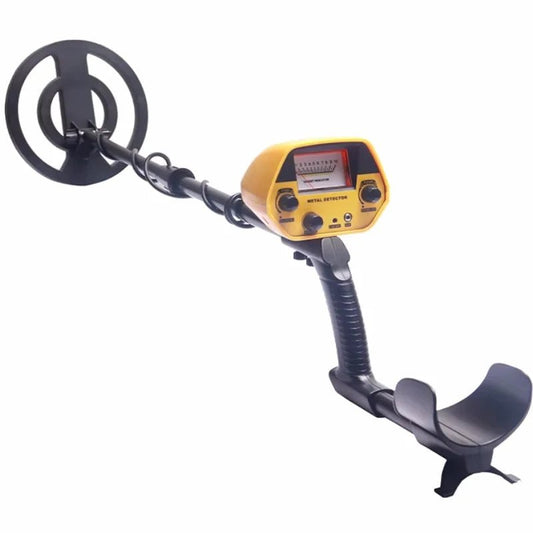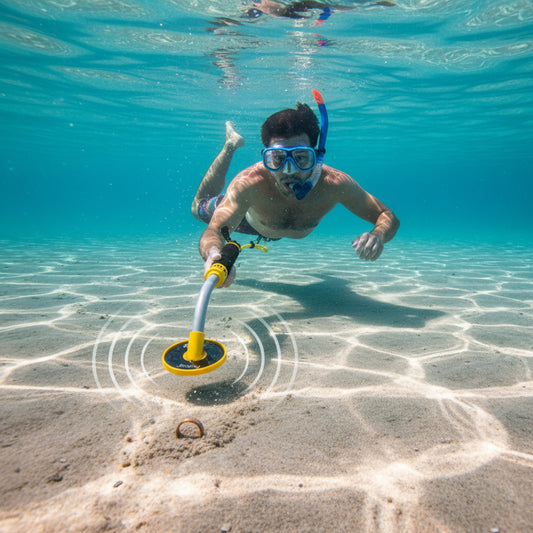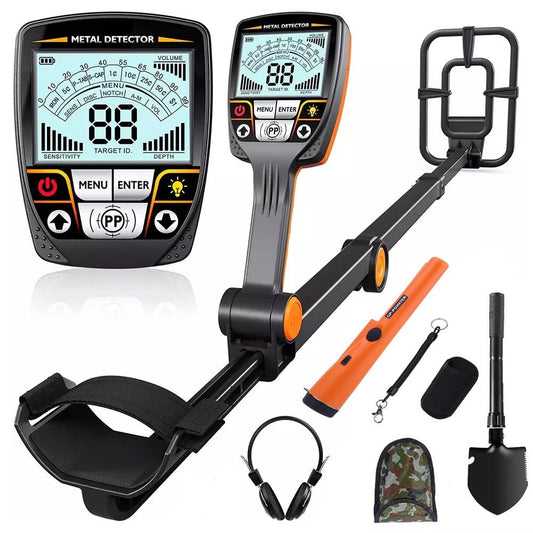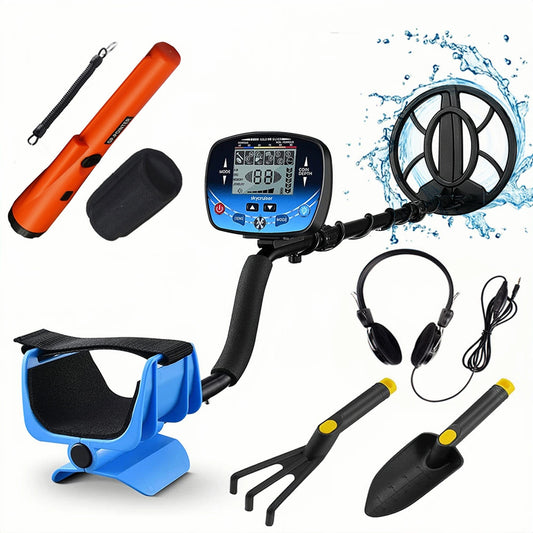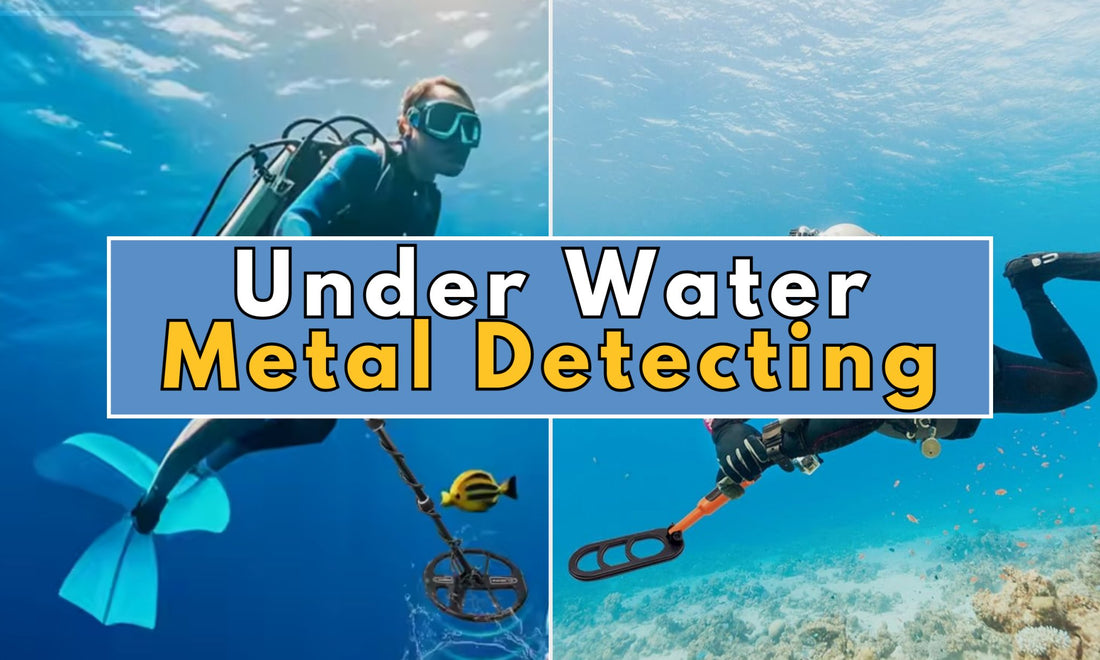
Choosing the Best Underwater Metal Detector: Top Picks and Buying Guide
Share
What is an Underwater Metal Detector?

An underwater metal detector is designed to operate in water and withstand the challenges of underwater terrain. Unlike traditional metal detectors for land use, underwater models are specifically built to handle high levels of moisture and resist water pressure. Underwater metal detectors are used to locate valuables buried in sand or mud in shallow waters, as well as to dive into deeper waters to search for historic relics.
Differences Between Land and Underwater Metal Detectors
While both types of detectors work on the principle of electromagnetic fields, underwater metal detectors are typically waterproof or submersible and built to withstand underwater pressure. They often feature watertight casings, special seals, and water-resistant search coils. Another unique feature of underwater detectors is their ability to filter out salt interference, which is essential when searching in saltwater environments like beaches and oceans.
Types of Underwater Metal Detectors: VLF vs. Pulse Induction
There are two main types of underwater metal detectors:
-
VLF (Very Low Frequency): VLF detectors are more sensitive to small objects and are generally better for discriminating between different types of metals. They work well in freshwater environments where mineral interference is minimal.
-
Pulse Induction (PI): PI detectors excel in mineralized and saltwater conditions, as they are less affected by salt and mineral interference. Pulse induction models are often the preferred choice for beach and saltwater detecting, where they can penetrate deeper than VLF detectors.
Common Uses for Underwater Metal Detectors
Underwater metal detectors are used for a variety of purposes:
- Beachcombing and shallow water searches: Detecting for lost items such as jewelry, coins, or keys in shallow water areas along the beach.
- Deep-water treasure hunting: Diving to locate valuable relics, coins, or artifacts from shipwrecks or historical sites.
- River and lake exploration: Searching in freshwater bodies to find items lost by swimmers or valuable objects hidden in mud and silt.
How to Choose the Best Underwater Metal Detector
Choosing the right underwater metal detector depends on several factors, including where you plan to use it, your budget, and the types of items you hope to find. Here are some key features to consider when selecting the best underwater metal detector for your needs.

Key Features to Look For in an Underwater Detector
-
Depth Rating: Different models are rated for varying depths. Some are suited for shallow water, while others can handle depths of up to 200 feet or more. Consider your intended search depth to choose a model with an adequate rating.
-
Sensitivity and Discrimination: Sensitivity refers to how well the detector can locate small or deeply buried objects. Discrimination allows the detector to filter out unwanted metals, helping you avoid junk items and focus on valuables.
-
Battery Life: Long battery life is important for underwater detectors, especially for deep-water searches or longer beach hunts. Rechargeable batteries or models with replaceable batteries can be convenient options.
-
Weight and Ergonomics: A lightweight, ergonomic detector is ideal for both beach and underwater use, reducing strain and making it easier to maneuver.
Waterproof vs. Submersible Detectors
Not all underwater detectors are fully submersible. Waterproof metal detectors can handle shallow water and wet sand, while submersible detectors are designed for complete underwater use. If you plan to dive into deeper water, opt for a submersible model to ensure durability and effectiveness at depth.
Sensitivity and Depth Ratings
Sensitivity and depth ratings are essential to finding valuable items, especially in saltwater and mineral-rich environments. Pulse Induction detectors typically offer higher sensitivity and can detect objects deeper in saltwater, making them popular for beach hunting. VLF detectors, on the other hand, perform well in freshwater and provide greater discrimination capabilities, allowing you to distinguish between different metals more easily.
Top Recommendations: Best Underwater Metal Detectors

Here are some top-rated underwater metal detectors that cater to different budgets and needs. Each model has unique features tailored for underwater detection, and they have received positive reviews for their performance in aquatic environments.
Garrett Sea Hunter Mark II – Best for Saltwater
The Garrett Sea Hunter Mark II is a Pulse Induction detector renowned for its excellent performance in saltwater environments. With adjustable discrimination settings, it’s ideal for eliminating unwanted signals from junk metals, making it a strong choice for saltwater treasure hunts.

The Garrett Sea Hunter Mark II is fully submersible up to 200 feet, making it suitable for beach detecting and underwater dives alike. Known for its durability and sensitivity, this model is a favorite among beach metal detecting enthusiasts.
Minelab Excalibur II – Best for Versatility
The Minelab Excalibur II is a versatile underwater metal detector that uses Minelab’s unique BBS (Broad Band Spectrum) technology, which operates across multiple frequencies to improve sensitivity in diverse environments.

This detector performs exceptionally well in both saltwater and freshwater, making it an excellent choice for detectorists who want flexibility. With an impressive depth rating of up to 200 feet and powerful discrimination capabilities, the Excalibur II is one of the best underwater metal detectors for both beach and deep-water detecting.
Underwater Metal Detector Q10 – Compact and Budget-Friendly
The Underwater Metal Detector Q10 is a compact and budget-friendly underwater metal detector designed for shallow-water and scuba diving use.

Though smaller than full-sized detectors, it’s powerful and capable of detecting small items in wet sand or shallow water.
It is the perfect tool for underwater treasure seekers.
Whether you're a professional diver or a hobbyist, this hand-held detector will help you uncover hidden metals with ease and precision, even in the most challenging environments .
How Much Are Underwater Metal Detectors?

The cost of underwater metal detectors varies based on features, depth rating, and technology. Whether you’re a beginner looking for an entry-level detector or an experienced diver interested in high-end models, there are options across a range of price points.
Entry-Level Detectors and Price Range
Entry-level underwater metal detectors are ideal for hobbyists or those just getting into beach and shallow water detecting.
These models typically cost between $150 and $300 and often include basic waterproofing for shallow water and wet sand. They may not have high-depth ratings but work well for beachcombing and shallow freshwater hunting.
Models like the Q10 Metal Detector fall into this category and are great for casual users or beginners.
Mid-Range Models for Hobbyists
Mid-range underwater metal detectors are suited for hobbyists who plan to detect in both freshwater and saltwater. These models, priced around $400 to $800, often feature more advanced sensitivity and discrimination capabilities, allowing users to adjust settings based on target metals. Models like the Garrett Sea Hunter Mark II and Fisher CZ-21 fall within this price range, offering a balance of quality and depth for both beach hunting and scuba diving.
High-End Detectors for Serious Enthusiasts
High-end underwater metal detectors, priced from $900 to over $1,500, are designed for serious detectorists who want advanced features and capabilities. These detectors typically feature multi-frequency technology, high sensitivity to gold and other precious metals, and depth ratings exceeding 200 feet. The Minelab Excalibur II is a prime example of a high-end underwater detector, known for its performance in saltwater and versatility in diverse conditions.
FAQs About Underwater Metal Detectors
If you’re considering buying an underwater metal detector, you may have some questions about how to get the best results. Here are answers to frequently asked questions to help you make the most of your underwater metal detecting experience.

What is the Best Underwater Metal Detector for Beginners?
For beginners, a model like the Quest Scuba Tector is an excellent choice. It’s affordable, lightweight, and easy to use, with enough sensitivity for detecting coins, jewelry, and small items in shallow water. For those who want more depth capability, the Garrett Sea Hunter Mark II provides more advanced features while remaining beginner-friendly.
Are Pulse Induction Detectors Better for Saltwater?
Yes, Pulse Induction (PI) detectors are generally better for saltwater environments. PI technology minimizes interference from salt minerals, making it ideal for beach and ocean detecting. Models like the Garrett Sea Hunter Mark II and Fisher CZ-21 are designed with saltwater detecting in mind, offering high sensitivity and depth capability without the interference issues found in VLF detectors.
Can Underwater Metal Detectors be Used on Land?
Yes, many underwater metal detectors can also be used on land, though they may lack the discrimination precision of detectors specifically designed for land use. However, models like the Minelab Excalibur II, which performs well on both land and in water, offer versatility for those who want an all-purpose detector. Switching between beach, water, and land allows you to enjoy various detecting experiences without needing multiple devices.
Final Thoughts on Choosing the Right Underwater Metal Detector
Selecting the best underwater metal detector depends on your detecting environment, budget, and target items. Whether you’re interested in shallow beach searches or deep-water treasure hunts, there’s a detector that will meet your needs.
Tips for Maintaining Your Underwater Metal Detector
To prolong the lifespan of your underwater metal detector, it’s essential to follow a regular maintenance routine:
- Rinse After Use: After each use, especially in saltwater, rinse your detector with fresh water to remove salt and mineral deposits that can corrode the device.
- Inspect Seals and O-Rings: Check for wear and tear on seals and O-rings that protect your detector from water leaks. Replace these parts if they show signs of damage.
- Store Properly: Store your detector in a cool, dry place and avoid exposing it to extreme heat or cold, which can damage the electronics and seals.
- Regular Battery Checks: Keeping your batteries fresh is essential, as weak batteries can affect performance. If your detector has rechargeable batteries, ensure they are fully charged before each hunt.
Planning Your Next Underwater Treasure Hunt
With the right underwater metal detector and a bit of preparation, your next treasure hunt can be an exciting and rewarding experience. Explore new beaches, rivers, and lake beds, and enjoy the thrill of discovering lost treasures hidden below the surface. With each outing, you’ll build skill, learn more about your detector, and increase your chances of making incredible finds.

